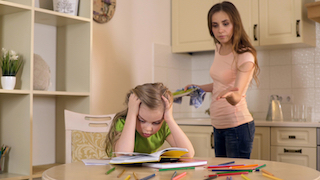 A new study published in the American Psychological Association’s publication, Developmental Psychology has found that overcontrolling parenting, or what’s been termed “helicopter parenting” in the media, contributes to emotional and school age problems in children.
A new study published in the American Psychological Association’s publication, Developmental Psychology has found that overcontrolling parenting, or what’s been termed “helicopter parenting” in the media, contributes to emotional and school age problems in children.
The study, titled, Childhood Self-Regulation as a Mechanism Through Which Early Overcontrolling Parenting Is Associated With Adjustment in Preadolescence was authored by Nicole B. Perry of the University of Minnesota, and Jessica M. Dollar, Susan D. Calkins, and Susan P. Keane of the University of North Carolina.
Researchers looked at what kind of an effect overcontrolling parents of toddlers had on a child’s ability to regulate his/her emotions and inhibitory behavior over an eight year period from age two to age ten both at home and at school. This time period was chosen because researchers said it helped them understand how and why changes might have occurred due to overcontrolling parenting.
Toddlerhood is a time when children begin testing the limits of their autonomy and also testing the limits of parental control. It’s the first time a child gains some independence. They learn how to walk and begin talking and expressing their desires in a more forceful manner. This is when parents can fall into a trap of becoming overcontrolling and clashes of control can emerge between parents and children.
Three theories were tested. The first theory looked at whether parents who were overcontrolling during their child’s toddler years would negatively affect the child’s own ability to learn how to self-regulate his/her emotions and self-inhibit certain behaviors by the time they reached age five.
The second theory looked at kids with self-regulation problems at age five and whether they would continue to exhibit these problems by age ten academically as well as socially and emotionally. The third theory looked at whether overcontrolling parental styles in toddlerhood could be linked to problem self-regulatory skills of the child in preadolescence.
To test their theories and overall hypothesis that “overcontrolling at age two would be associated negatively with emotional regulation and inhibitory control at age five which in turn would be associated with lowered social, emotional, and academic adjustment at age ten,” researcher used an ongoing longitudinal study called the Right Track study which is tracking the social and emotional development of children.
An approximate equal number of girls and boys were included in the study of 307 economically diverse families with 422 children, 37 per cent of which were identified as being at risk for future externalizing problems at age two. Data was obtained by video tapes of children and their mothers interacting at age two during a pretend play and clean-up task. For the pretend play segment, mothers were instructed to play as they normally would with their child and was given toys to play with. Then the mother was told to work with her child to clean-up the toys for the second segment. Researchers watched for overcontrolling parenting during the play and clean-up segments.
At age five, data was obtained using the “I’m Not Sharing” exercise in which the child’s ability to self regulate his/her emotions is observed as candy is given to the researcher and the child, but more candy is given to the researcher and then the researcher takes the child’s candy and eats it.
Also at age five, the child’s inhibitory control functions were tested using the “Shape Stroop” task whereby the child had to ignore a large shape among smaller shapes during an identification process.
Mothers also filled out the Child Behavior Checklist measuring aggressive, destructive and oppositional behaviors. Data from the children themselves was obtained at age ten and their teachers’ input was obtained for the children at age five and ten using the 109 question Teacher Rating Scale and by completing the Academic Performance Rating Scale and Social Skills Rating System.
The results of the study were in line with the researchers’ hypothesis: that overcontrolling parenting in early childhood can have a negative effect on a child’s emotional self-regulation capabilities and academic performance in school at age five and age ten.
“If parents try to exert too much control over these situations and step in before children try to handle the challenge independently, or physically keep children from these frustrating or fearful contexts all together,” note the authors of the study, “they may, unintentionally, hinder the development of children’s independent self-regulatory abilities.
Patricia Tomasi is a mom, maternal mental health advocate, journalist, and speaker. She writes regularly for the Huffington Post Canada, focusing primarily on maternal mental health after suffering from severe postpartum anxiety twice. You can find her Huffington Post biography here. Patricia is also a Patient Expert Advisor for the North American-based, Maternal Mental Health Research Collective and is the founder of the online peer support group - Facebook Postpartum Depression & Anxiety Support Group - with over 1500 members worldwide. Blog: www.patriciatomasiblog.wordpress.com
Email: tomasi.patricia@gmail.com